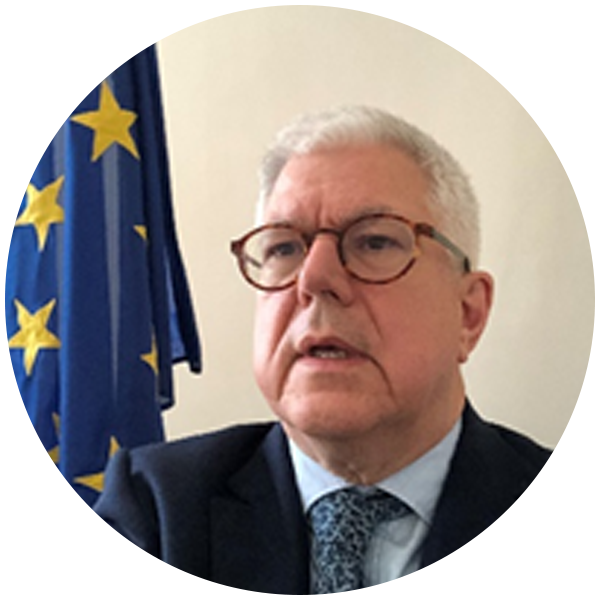© 2022 All rights reserved

• How are global economic changes influencing Europe’s financial sector, and what strategic moves should be made to adapt?
• What measures can be put in place to enhance the resilience of Europe’s financial industry against future economic shocks or crises?
• What impact are emerging technologies having on the financial industry, and how can the EU’s financial sector leverage these for a competitive advantage?
• What were the major regulatory changes in the last political cycle, and what has been their effect on the financial sector?
• Given the evolving landscape of the financial industry, what should be the primary objectives for the new legislative term?
• What are the principal elements that drive global competitiveness in the financial sector, and what steps can be taken to elevate Europe’s standing in these critical areas?
• What additional initiatives, either driven by policy or the industry, are necessary to boost competitiveness?
• What strategies are essential for the successful implementation of the Capital Markets Union?
• In what ways can the European financial sector support the EU’s objectives for climate and sustainable finance?
• What is the current state of digitalization within the financial services industry?
• Does the EU’s policy stance and regulatory oversight need to adapt to better facilitate the digital transformation of its financial sector?
• What should be the focus areas in the forthcoming political cycle regarding digital finance (such as implementing existing proposals, tailoring them more closely to the needs of the financial sector, or completing the regulatory landscape in specific domains)?
• How is artificial intelligence reshaping critical operations and services in the financial sector? What opportunities does AI present for enhancing decision-making, risk assessment, and customer service?
• What are the major challenges that financial institutions face in integrating AI technologies? How do issues like data privacy, ethical AI use, and algorithmic transparency impact consumer trust and regulatory compliance?
• What specific policies and regulatory frameworks are necessary to support the safe and effective integration of AI in financial services? How can regulations ensure that AI advancements do not exacerbate financial inequalities or systemic risks?
• Looking ahead, what can be expected from the evolution of AI in finance in terms of new capabilities or transformative impacts? What preemptive measures should policymakers and industry leaders consider to harness these advancements while mitigating associated risks?
• How can digital tools and technologies be harnessed to promote sustainability goals in finance, such as through green bonds and sustainable investments?
• What opportunities, challenges, and risks does digitalization present for users and stakeholders in the market?
• How can digital finance be used as a tool to improve financial inclusion, especially for underserved and unbanked populations within the EU?
• Are current digital and financial policies adequately supporting the advancements in digital finance and addressing emerging challenges?
• Is there a need for further action to mitigate operational challenges stemming from digitalization?
• How can regulatory and policy environments contribute to a more competitive European financial market, and what enhancements are necessary?
• How can broad theoretical support for the Capital Markets Union be translated into concrete, actionable plans?
• What key areas should the CMU target in the new European legislative term for maximum impact? Is there a need to alter the strategic approach to the CMU or reshape the ongoing discussions surrounding it?
• What specific actions are required to dismantle the legal and structural impediments to cross-border capital movements?
• In what ways can we facilitate easier access to market-based financing for businesses, particularly SMEs?
• What can be done to motivate retail savers to engage more in investments by both introducing incentives and removing existing barriers?
• Assessing the effectiveness of MiFID II/MiFIR: Have it successfully fostered fair, transparent, and efficient markets? What areas still need improvement?
13.30-14.00 Registration and welcome coffee
14.00-15.00 Session 1: Setting the scene – the C-level perspective
15.00-15:15 Coffee break
15.15-16.15 Session 2: Digital transformation of EU’s financial services
16.15-16.30 Coffee break
16.30-17.30 Session 3: The future of European financial regulation

Director-General, DG FISMA, European Commission
John Berrigan is the Director-General of the Directorate-General for Financial Stability, Financial Services and Capital Markets Union (DG FISMA) of the European Commission. DG FISMA is responsible for EU-level policy-making and legislative initiatives with respect to the financial sector, including Banking Union, Capital Markets Union, sustainable finance, digital finance, anti-money laundering and sanctions. In this context, John represents the European Commission on the Economic and Financial Committee and the Financial Services Committee, which report to EU Finance Ministers. He also represents the Commission on the Financial Stability Board, which reports to G20 Finance Ministers. He attends the European Systemic Risk Board and is a permanent observer on the Single Resolution Board. John has a master’s degree in economics from University College Dublin. He is married with two children.

Chairman, FSMA and Chairman of the Board, IOSCO
Jean-Paul Servais is the Chairman of the board of the International Organization of Securities Commissions (IOSCO). He was elected in October 2022 and re-elected in May 2024 for another term of 2 years. IOSCO is the membership organization composed of the world’s financial markets regulators involved in the supervision of 95 % of the financial sector at international level. He is also the Chairman of the IOSCO European Regional Committee Jean-Paul Servais is the first Belgian to be elected Chairman of IOSCO. As IOSCO Chairman, he helped bring about major international breakthroughs in the regulation of crypto currencies and in introducing reporting standards on sustainability. Between 2017 and 2023, Mr. Servais chaired the IFRS Foundation Monitoring Board; in parallel, he was the co-chair of the Monitoring Group (2021-2023). Within IOSCO, Jean-Paul also led the SPAC network, which successfully delivered a final report in May 2023. Besides his international responsibilities, Mr Servais is the Chairman of the Belgian Financial Services and Markets Authority (FSMA). In this capacity, he is a board member of other international supervisory bodies for the financial sector such as the European Securities and Markets Authority (ESMA), and the European Systemic Risk Board (ESRB). Under Jean-Paul Servais’ impetus, the FSMA launched in 2013 the now very successful Wikifin financial education programme. And in 2020, the Wikifin Lab opened in Brussels. Jean-Paul teaches at the Université Libre de Bruxelles (ULB, University of Brussels), where he is part-time professor in International Business Law and in the specialised Master in Tax Law. He is author or co-author of more than 500 contributions, mostly engaging on European and international systems of financial supervision and regulation issues.

CEO, Euroclear group
Valérie Urbain became Chief Executive Officer of the Euroclear group in May 2024 having previously served as Chief Business Officer and a member of the Euroclear group Management Committee. Before her position as CBO she was Chief Executive Officer at Euroclear Bank, with responsibility for Euroclear Bank’s Operations, Commercial, Client Service, Banking and Network Management divisions worldwide. Between 2009 and year end 2014, Mrs. Urbain was the CEO of the three ESES Central Securities Depositories (CSDs), namely Euroclear Belgium, Euroclear France and Euroclear Nederland. Prior to this, she was Managing Director and head of the Human Resources division of the Euroclear Group from 2005 until 2009. Earlier in her career, Mrs. Urbain held a number of positions in Product Management, Commercial and Network Management. Before joining Euroclear in 1992, Mrs. Urbain worked in the Investment Banking and Bond Sales departments of Banco Hispano Americano and in the Corporate Banking division of Continental Bank (both in Brussels). Mrs. Urbain holds a degree in Commercial Engineering from the Solvay Business School (Belgium).

CEO, Clearstream Securities Services
Samuel Riley is a member of the Executive Board and CEO of Clearstream Holding AG, Clearstream Securities Services. Sam joined Clearstream in 2019 and became Head of Investor Services & Financing in 2020. Previously, he had a long-standing career at Citigroup, where he most recently served as Global Head of Custody Operations. His earlier responsibilities there included leading the EMEA Service Centres & Shared Services organisation and being an Executive Board Member of Citigroup Global Markets Deutschland AG. Samuel Riley holds a degree in Business Management from Wolverhampton University.

Judge, General Court, Court of Justice of the European Union
Pēteris Zilgalvis is a Judge on the General Court of the European Union. He is a Member of its Management Board and of the Artificial Intelligence Management Board of the Court of Justice of the EU. Previously, he was the Head of Unit for Digital Innovation and Blockchain in the Digital Single Market Directorate in the European Commission and was the Co-Chair of the European Commission FinTech Task Force. He was the Visiting EU Fellow at St. Antony's College, University of Oxford and was an Associate of Political Economy of Financial Markets there. Before that he was Deputy Head of the Bioethics Department in DG Legal Affairs at the Council of Europe. Earlier, he was Senior Environmental Law Advisor to the World Bank/Russian Federation Environmental Management Project and was a Regional Environmental Specialist at the World Bank. His career started in the Latvian ministries of environment and foreign affairs. He completed his J.D. at the University of Southern California and his B.A. in Political Science Cum Laude at UCLA.

Deputy Head of Unit, Digital Finance, European Commission
Mattias Levin is the deputy head of unit of the Digital Finance unit of the European Commission’s Financial Stability, Financial Services and Capital Markets Union DG ("FISMA"). At FISMA, he has previously worked on regulation related to banks, investment firms, conglomerates and financial market infrastructures. Before joining DG FISMA, he was a member of the Bureau of European Policy Advisers (BEPA), a think tank attached to the President of the European Commission. Prior to joining the Commission, Mattias was a Research Fellow at the Centre for European Policy Studies (CEPS). Mattias studied at the London School of Economics, Lund University and the Institut d’Etudes Politiques of Strasbourg.

Chief Product Officer, Moody’s
Nick Reed is the Chief Product Officer for Moody’s Analytics, where he focuses on understanding our customer needs and aligning our products to address those needs. His goal is to ensure our customers can harness the power of diverse solutions across Moody's Analytics, and use them for the benefit of their customers. Nick joined the company from ANZ Bank, where he was the Group General Manager of Risk and managed all risk systems, process modernization, offshoring, customer aggregation and management systems, calculation engines, analytics platforms, and all enterprise projects, processes, and people. His work history spans banking and finance, digital and internet technology, insurance and superannuation in senior managerial roles with experiences in Australia, Hong Kong, the United Kingdom, and the United States. Nick graduated with a Bachelor's degree in Economics & Commerce (Banking/Finance) from the University of Melbourne. He also completed post-graduate work in Strategy at the Stern School of Business at New York University; Digital Transformation at the MIT Sloan School of Management at the Massachusetts Institute of Technology; and Architecture at the University of Technology Sydney.

Head of Analytics, LSEG
As part of the Data and Analytics Leadership team at LSEG, Emily leads the Analytics business and is the CEO of Yield Book. In this role Emily spearheads the transformation of trusted data into actionable and AI-powered insights across LSEG. With a background of over 15 years in quantitative financial analytics at leading institutions such as Lehman Brothers, Barclays and BlackRock, Emily has extensive experience developing analytics solutions for customers. Emily also holds board positions with Turquoise and Finbourne.

Head of Research and Advocacy, Finance Watch
Julia Symon has extensive working experience in the banking industry. Prior to joining Finance Watch, she spent ten years working as an internal audit manager for two international banks in Germany. Julia joined Finance Watch in 2021 and was appointed as the Head of Research and Advocacy in January 2022. Her areas of expertise cover banks’ risk management and internal control system, in particular credit risk and lending processes, capital adequacy assessment,; governance, regulatory compliance, as well as custody and investment management services. Julia has experience of banks´ supervisory interactions under supervisory review and evaluation process (SREP). At Finance Watch, she has worked on banking and insurance prudential regulation, climate-related financial risk, sustainable finance and Capital Markets Union, among others. Julia holds a Master’s degree in international economics with majors in financial management and international trade from the University of Konstanz, Germany, and a Master’s degree in international economics / European integration from the Kyiv National Economic University. She also obtained a certified Financial Risk Manager (FRM) qualification from the Global Association of Risk Professionals.

Head of Global Data & AI, Allianz SE
Susan Wegner is Head of Group Data & AI at Allianz SE. Before she joined Allianz, she was Managing Director at Deloitte Digital where she carried responsibility across industries in data & AI applications. Prior to this, Susan was VP of Artificial Intelligence and Data Analytics at Lufthansa Industry Solutions where she led the development and implementation of innovative AI and platforms solutions. During her tenure at Deutsche Telekom, she held the position of VP Data, Artificial Intelligence and Governance (Chief Data Officer) with a focus to drive AI Strategy and Capability Initiatives across the Group. Furthermore, Susan is also a Member of the 6G Committee of the 6G Academy; she was also a Board Member of the Bitkom Big Data Group, and she was an external Consultant for the SAP Board. In addition, Susan was a member of the expert group for Data Exchange between companies and authorities for the European Commission.

Director, Horizontal policies DG FISMA, European Commission
Marcel Haag studied law at the universities of Freiburg, Bonn, Strasbourg and at the EUI in Florence and qualified as a judge in Düsseldorf. After a short stint in business, he joined the European Commission and worked in different Commission services. Until the summer of 2020 Mr Haag served as a Director for policy coordination in the Secretariat-General of the Commission. He is currently Director for Horizontal policies at the Directorate-General for Financial Stability, Financial Services and Capital Markets Union.

Member of the European Parliament
Markus Ferber, engineer by profession, has been a Member of the European Parliament since 1994. Currently, he serves as EPP Coordinator for the European Parliament’s Economic and Monetary Affairs Committee. As rapporteur for the recast of the Markets in Financial Instruments Directive (MiFID II) he has been the European Parliament’s lead negotiator for one of the key pieces of post-crisis financial markets regulation. Markus Ferber takes a keen interest in financial services, banking legislation as well as insurance regulation.

Founder and Senior Advisor, Better Finance
Guillaume Prache is Senior Advisor of BETTER FINANCE. Following nearly 15 years creating and then developing BETTER FINANCE as Managing Director up to June 2023, he focusses on policy and research in his new role as Senior Advisor. He is also one of the experts representing financial services users at EU-level, notably before the European Commission (lastly as a member of the HLF CMU – High-Level Forum on Capital Markets Union), before the European Securities & Markets Authority as a member and former chair of the ESMA Securities & Markets Stakeholder Group, and before the European Insurance and Occupational Pensions Authority as a member of the EIOPA IRSG – Insurance and Reinsurance Stakeholder Group (and formerly as a member of the EIOPA Occupational Pensions Stakeholder Group and of the EBA Banking Stakeholder Group). He is also an expert for the French financial regulator AMF. And he is the President of FAIDER, the largest individual investor organization in France, and a member of BETTER FINANCE. He started as a magistrate at the French Court of Auditors and has an extended and international experience in financial matters, notably as Chief Financial Officer of US-based Rhône-Poulenc Rorer, Inc., a “Fortune 500” publicly listed pharmaceutical company (today Sanofi) from 1997 to 2000, and then as Managing Director of the European subsidiary of the Vanguard Group, Inc., a global leader in asset management, from 2000 to 2006. He has taught asset management for the CIWM (Certified International Wealth Manager) program and wrote two books and various articles on economics and finance.

Director Government Affairs Europe, Euronext
Daphne van der Stam joined Euronext Amsterdam in 2004, and was appointed Director Government Affairs Europe in 2018. In this role she coordinates Euronext’s group advocacy positions with a team of professionals based in multiple locations in Europe. Her experience spans over 20 years working in the capital markets, with multiple positions in the Government Affairs and Legal departments of Euronext. Among others, she was actively involved in the merger processes of Euronext in 2007 and 2013. Before her career at Euronext, Daphne worked as a lawyer at Simmons & Simmons in the Netherlands, with a strong focus on the M&A field and financial law. Daphne graduated with a Master’s degree in law from the Erasmus University in Rotterdam. She also graduated with honours from the post-graduate programme on securities law at the Grotius Academy in Nijmegen.

Managing Director, Meade Davis Communications






© 2022 All rights reserved
